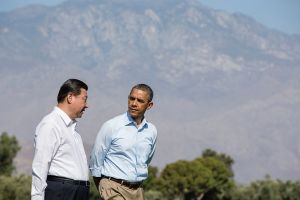Recent survey data shows the US public's overall feeling is that the US should cooperate with China rather than actively work to limit its advances.
The US-China summit in Washington, DC, will take place against a backdrop of security challenges facing the bilateral relationship. These include cyberattacks that have been ascribed to Chinese hackers and continued friction over China’s maritime activities in the South and East China Sea. While the American public is not particularly alarmed over—or is perhaps unaware of—China’s territorial advances, it expresses a significant amount of distrust toward China to deal responsibly with world problems. Yet given the importance of US-China relations, the public’s overarching inclination is that the United States actively cooperate with China rather than actively try to limit its rise.
Americans Underscore Importance of US-China Ties
As President Obama and President Xi meet, emphasizing the importance of the US relationship with China should not be difficult to accomplish. Americans already place high value on bilateral relations with China—88 percent define the US-Sino relationship as important with more than 50 percent saying that US-China relations are very important. Americans view this relationship as at least equal to, if not more important than, key allies Japan and South Korea.
Importance of US Relations
In fact, these results follow a longer trend showing American recognition of regional influence shifting from Japan to China since the late 1990s. From 1998 to 2012, Americans were asked if China or Japan were more important to the United States in terms of vital interests. In 1998, 47 percent cited Japan versus 28 percent that cited China. When the question was last asked in 2012, 70 percent cited China versus 27 percent for Japan.
While Americans may view the relationship as important as other allies in the region, the public does not feel nearly as warmly toward China as it does toward Japan and South Korea. In the 2014 Chicago Council Survey, Japan (62) and South Korea (55) were both ranked higher than China (44) on a 0-100 scale.1 Moreover, Americans tend to express mistrust toward Beijing. Just 34 percent think China will deal responsibly with problems facing the world, and 56 percent state China plays a negative role in resolving the key problems facing Asia.
Despite suspicions toward China, the American public prefers engagement to the containment of China. In the 2014 Chicago Council Survey, 67 percent of Americans said the United States should undertake friendly cooperation and engagement with China. Three in ten (29%) said that the United States should seek to actively limit China’s growth. This finding has been consistent since the question was first asked in 2006.
China's Influence in Asia Rising
Americans underscore the importance of ties to China likely because of growing Chinese influence in Asia. Fifty-two percent expect that China’s influence in Asia will grow in the next ten years, compared to just 31 percent who expect the same from the United States.2
Some expectation of China’s influence in the next decade, however, is based on misperception. From 2010 through 2014, Pew Research surveys showed that Americans were either as likely or more likely to name China as to name the United States when asked which country is the world’s leading economic power. In the most recent spring 2015 survey, however, Americans were more likely to say that the United States leads by ten percentage points (46% US, 36% China), perhaps a reflection of China’s economic difficulties over the past several months as well as US economic recovery.
China Perceived as Low-Level Threat
Asked specifically about the development of China’s military and economic power separately, Americans are not overly concerned about either one. While 41 percent cite Chinese military power as a critical threat, 31 percent think that China’s economic power is a critical threat. This places both in the bottom half of critical threats on a list of more than twenty. Even less concerning to the American public are China’s territorial disputes with its neighbors—just 22 percent identify these disputes as a critical threat facing the United States.
One area where threat perceptions may be greater is cyberattacks on US computer networks. Seven in ten (69%) Americans identify cyber attacks as a critical threat to the United States, though the Chicago Council Survey question did not identify these attacks as originating from any one country. This places it second on the list of all potential threats included in the survey. In addition, a spring 2015 Pew survey finds that Americans view cyber attacks from China as a more serious threat (54% very serious) than the US trade deficit to China (52%), China’s impact on the environment (49%), and China’s growing military power (47%).
Hesitancy for US to Get Involved in Conflict
Americans do not see China’s military as a critical threat but remain wary of scenarios that would likely result in serious conflict. If China were to invade Taiwan, just 28 percent support the use of US troops to defend Taiwan, a finding that has remained stable over time. If China initiated a military conflict with Japan over disputed islands, only one-third (33%) favor the use of US troops to come to Japan’s aid. In both scenarios, there is virtually no difference between Republican and Democratic supporters.
This reticence likely derives from reluctance to engage in conflict with a formidable Chinese military. In the case of tensions on the Korean Peninsula, roughly three in ten cite these tensions as a critical threat—similar to those that cite China’s territorial ambitions as a critical threat. However, should North Korea invade South Korea there is much greater support (47%) to use US troops to defend South Korea.
About the Chicago Council Survey
The analysis in this report is based on data from the 2015 Chicago Council Survey of the American public on foreign policy. The 2015 Chicago Council Survey was conducted by GfK Custom Research between May 25 and June 17, 2015, among a national sample of 2,034 adults, 18 years of age or older, living in all 50 US states and the District of Columbia using the KnowledgePanel, GfK’s largescale, probability-based nationwide online research panel. The margin of error ranges from ± 2.2 to ± 3.1 percentage points depending on the specific question, with higher margins of error for partisan subgroups.
The 2015 Chicago Council Survey is made possible by the generous support of the John D. and Catherine T. MacArthur Foundation, the Robert R. McCormick Foundation, the Korea Foundation, the United States-Japan Foundation, and the personal support of Lester Crown and the Crown family.
- 1It should be noted that Chinese hold similar views of the United States. In a 2015 poll, Pew found that 44 percent of Chinese view the United States favorably versus 49 percent that hold unfavorable views.
- 2 Though 2014 results show that Americans viewed the United States to be more influential than China overall, and expected that to remain the case in the coming decade.








